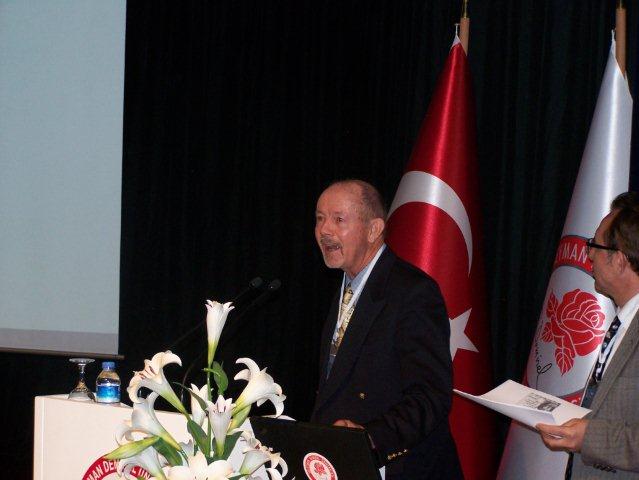Stats professor details recent stylometry work at international conferences
David Holmes, professor of mathematics and statistics, spent his fall break giving talks on stylometry at two international conferences. The first conference was the London Authorship Attribution Forum at the University of London, and the second was a symposium on Turkish Language and Literature: Language and Style Analysis of Literary Texts at Suleyman Demirel University in Isparta, Turkey.

Professor Holmes speaking at Suleyman Demirel University last fall.

David Holmes, professor of mathematics and statistics, spent his fall break giving talks on stylometry at two international conferences. The first conference was the London Authorship Attribution Forum at the University of London, and the second was a symposium on Turkish Language and Literature: Language and Style Analysis of Literary Texts at Suleyman Demirel University in Isparta, Turkey.
Stylometry is the statistical analysis of literary style. By comparing the frequency of commonly used words in different texts, stylometric analyses can help determine if a certain writer authored texts of disputed authorship. To do this, one needs genuine material by each member of a pool of contenders for authorship. “If you don’t have the right contender, it won’t be a match,” Holmes said.
At his presentations, Holmes discussed three recent case studies on which he has worked. The first relates to a book on card magic, The Expert at the Card Table. Holmes worked with Richard Wiseman, a professor of psychology at the University of Hertfordshire in England and a practicing magician, to try to determine the author of the book, whose identity has been cause for speculation for hundreds of years. “This was the only project I didn’t crack,” Holmes said. “I might not have had the right contender.”
“I was given a pool of candidates and I’m pretty certain that pool of candidates didn’t cover the right author,” Holmes said. “I did find evidence of multiple authors, but there was no evidence that any of the candidates authored the book.”
The second topic related to a project Holmes worked on with TCNJ history professor Daniel Crofts. Holmes and Crofts identified the author of The Diary of a Public Man, a controversial piece of Civil War literature, to be William Henry Hurlbert. Click here to read how Holmes and Crofts solved the mystery of the Public Man.
Holmes also spoke about his research into the Chard Reports, which recounted a battle at Rorke’s Drift during the Anglo-Zulu War of 1879. The reports described in great detail the Zulu attack on the British mission station and the subsequent British victory. The reports were supposed to have been written by Lieutenant John Chard, but numerous factors, including the accuracy and preciseness of the report, have cast doubt onto this claim.
Historians have suggested that Major Francis Clery was the actual author of the first Chard report. Through his research, Holmes has come to the conclusion that both of the Chard reports were written by the same author, but that the author was not Clery. A lack of genuine material written by Chard has made it hard to continue the analysis, Holmes explained. “We have nothing definitively written by Chard, so we can’t move on with the matching process,” he said.
Despite the time and effort that goes into conducting stylometric analyses, Holmes enjoys the process. “Stylometry is certainly time-consuming, but the reward for me comes from helping to solve a historical problem,” he said. “It’s great fun.”
Posted on February 10, 2012

